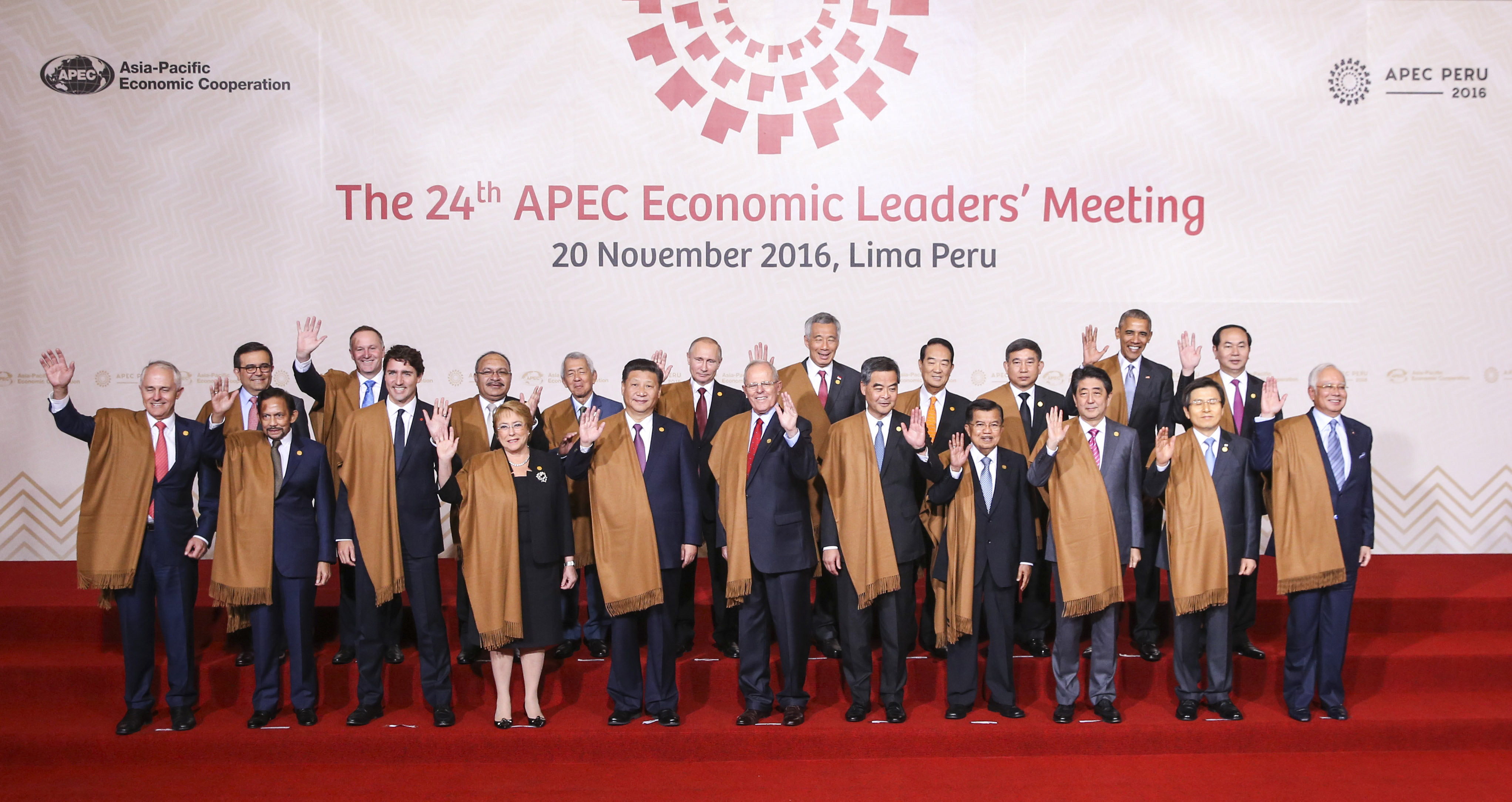Seminar focuses on diplomatic innovations

Leaders of the Asia-Pacific Economic Cooperation (APEC) countries pose for a group photo in Lima, capital of Peru, on Nov. 20. In his keynote speech at the 24th APEC Economic Leaders’ Meeting, Chinese President Xi Jinping proposed advancing the process of the Free Trade Area of the Asia-Pacific, which has been hailed by academia as enriching major-country diplomacy with Chinese characteristics.
A seminar on innovations in Chinese diplomatic theory and practice was recently held at China Foreign Affairs University in Beijing, where scholars summarized new trends in Chinese diplomacy since the 18th CPC National Congress.
“We need to advance the progress of the Free Trade Area of the Asia-Pacific (FTAAP) and build an open economy for the Asia-Pacific region,” said Chinese President Xi Jinping in his keynote speech at the 24th APEC Economic Leaders’ Meeting in Lima, capital of Peru, on Nov. 20 local time.
Scholars said the FTAAP is another Chinese proposal that further enriches major-country diplomacy with Chinese characteristics.
Facing such challenges as dysfunction in global governance, isolationism, conservatism, populism and other obstacles to economic globalization, the international community desperately needs to find a new way out. Based on its grasp of the new international climate, China has come up with fresh ideas and theories about diplomacy, gradually bringing into focus the major-country diplomatic theory system with Chinese characteristics.
Since it was first mentioned on the Report of the 18th CPC National Congress, the concept of a community of common destiny has been guiding the direction of Chinese major-country diplomacy like a beacon. “The community of common destiny is a groundbreaking theoretical innovation,” said Liu Jianfei, a professor from the Institute for International Strategic Studies of the CPC Central Party School.
Together with the community of common destiny, notions like adhering to the path of peaceful development, constructing new international relations with mutually beneficial cooperation at the core, and building fair, peaceful and inclusive partnerships have led Chinese diplomacy to the commanding height of human development.
Wang Cungang, a professor of diplomatic studies at Tongji University, said Chinese diplomatic proposals apply equal, fair and diversified justice in the spheres of international politics, economy and culture, respectively.
New theories have contributed to the continuous development of diplomatic practices, widening the path for major-country diplomacy with Chinese characteristics.
Liu pointed out that Chinese diplomacy has, since the 18th CPC National Congress, redefined its orientation based on the principle that “major countries are crucial, surrounding nations are primary, developing economies are foundational, and multilateral mechanisms are vital arenas.”
First, China actively participates in global governance. By presenting Chinese concepts, proposals and plans, it has substantially enhanced its international discourse and rule-making powers, Liu said. Moreover, the “Belt and Road” initiative—with the support of a series of projects like the Asia Infrastructure Investment Bank and Silk Road Fund—has brought huge economic and social benefits to countries along the routes.
In addition, China is striving to build a marine power, paying unprecedented attention to maritime issues, Liu said.
Foreign policy toward neighboring countries was also a focal point of the seminar. In October 2013, China held its first-ever diplomacy workshop for surrounding countries, putting forward the principles of amity, sincerity, mutual benefit and inclusiveness.
Ren Jingjing, an associate research fellow at the Institute of Contemporary China Studies at the Chinese Academy of Social Sciences, gave an overview of diplomacy with neighboring countries since the 18th CPC National Congress.
“China’s public diplomacy policy toward its neighbors has shaped an inclusive culture in surrounding areas, allowing different civilizations to learn from each other, realize co-existence and harmonious development, and advance the process of a community of common destiny,” Ren said.
As internal and external interaction has become a new salient feature of international politics in the 21st century, finding ways to coordinate the domestic and international situations is a grim challenge for countries around the world.
Zhang Qingmin, a professor of international studies at Peking University, said that “coordinating the domestic and international situations” to achieve institutional innovation is not only a diplomatic necessity. The process has also been a driver of innovation in Chinese diplomacy since the 18th CPC National Congress.
Chinese diplomacy has seen institutional innovation in terms of internal and external coordination among the security, economic and cultural fields, Zhang said.
Zhang used the economy as an example. Domestic reform was previously facilitated by the accession to the World Trade Organization, but the current free trade zone strategy has accelerated both domestic and international development.
Externally, free trade zone construction is structured through free trade agreements with neighboring countries and “Belt and Road” participants as well as global and regional agreements. Domestically, the groundwork for future integration into a global free trade zone network is laid by building high-standard pilot free trade zones, Zhang explained.
MAO LI is a reporter at the Chinese Social Sciences Today.

 PRINT
PRINT CLOSE
CLOSE